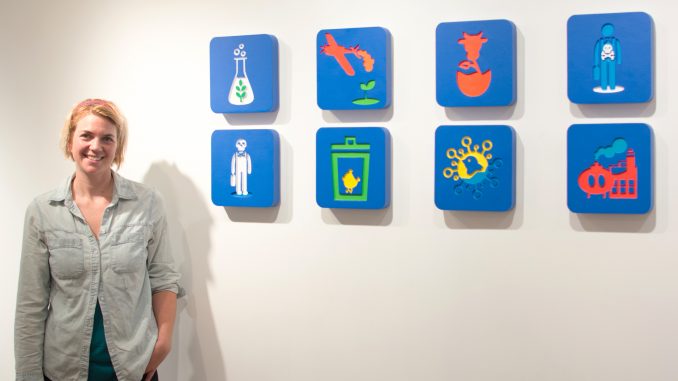
Abby Elizabeth Schmidt spends 25 to 75 hours meticulously positioning hundreds to thousands of grains of rice, barley, wheat and corn kernels to formulate a single piece of art.
Schmidt hopes to use the medium of art as a way to draw attention to controversial food industry practices like genetic modification, pesticides and factory farming. Some of her work is currently on display at Paradigm Gallery on 4th Street near Fitzwater in a solo show entitled “Subsidized Starvation,” which runs Sept. 24 to Oct. 17.
“The food industry is evolving and I would argue that it’s not for the better,” Schmidt said.
Schmidt has always strived to be conscious of her food choices. The evolving world of agribusiness and its politics are a concern that hits home for the mother of a 3-year-old son.
“Abby tells stories through her art in a way that relates to children, that’s what makes it so horrifying,” said Sara McCorriston, a co-owner of Paradigm Gallery.
One of Schmidt’s pieces entitled “Dirty Thirties: Part 1” captures Dust-Bowl-era children standing on a porch framed by barren surroundings, with an abandoned farm in the backdrop. The piece portrays Schmidt’s view of the current system of agriculture—genetically engineered foods and pesticides that create an apocalyptic world where nothing grows.
“I can see similarities between what happened during the 1930s and what is happening now,” Schmidt said.
The namesake piece of her collection, “Subsidized Starvation,” depicts an emaciated boy drinking a can of Coca-Cola. Schmidt wanted to highlight how processed foods take a toll on health in the form of obesity, diabetes and heart disease.
Though these issues are not necessarily related to starvation, Schmidt wanted to feature how bodies fueled on empty, processed calories are still malnourished.
Schmidt’s past pieces include one utilizing miniature toy soldiers to spotlight the children of war-torn countries. But her current focus reflects how food is an important part of everyday life ultimately taken for granted.
People largely ignore how food gets to their plate, so it’s easy to negate the consequences of “our subconscious decisions,” Schmidt said.
The concern for ethically-produced food extends past the gallery. Rad Dish is a student-run co-op on Main Campus that sources all food consciously. Co-founder Lauren Troop said the project took root when students became aware of the food system in Philadelphia.
“These students wanted to create awareness on campus to change the way we think about food,” Troop said.
Another project encouraging knowledge of consumption-related issues is Temple’s Food Desert Challenge. A food desert is an area with very limited access to fresh, affordable and nutritious foods. People in these areas are limited to less-nutritious, cheaper food options, like fast food.
The Food Desert Challenge was created by the Office of Sustainability as a resource for faculty to use in their classes.
“It gets them to think about consumption and food waste,” Office of Sustainability program manager Katherine Elmhurst said. “It was developed as a way for students to learn the challenges of living on $4.50 per day.”
“We should pay more attention to what we’re eating and have a greater role in the food process,” Schmidt said.
Casey Mitchell can be reached at caseymitchell@temple.edu.


Be the first to comment